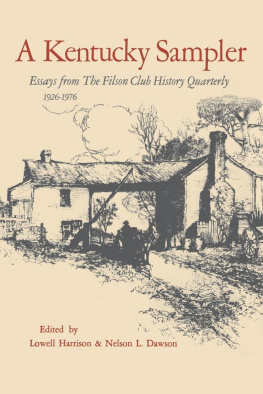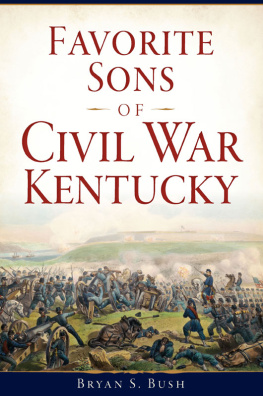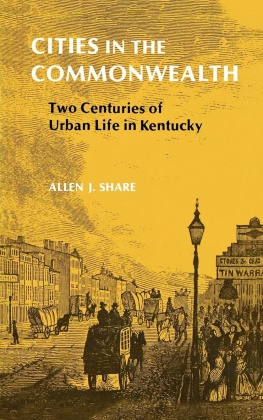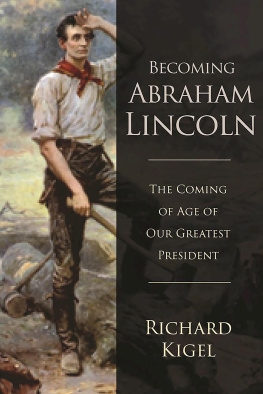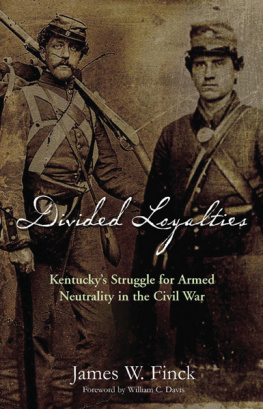Lincoln of Kentucky

Lowell H. Harrison
T HE U NIVERSITY P RESS O F K ENTUCKY
Publication of this volume was made possible in part
by a grant from the National Endowment for the Humanities.
Copyright 2000 by The University Press of Kentucky
Paperback edition 2009
Scholarly publisher for the Commonwealth,
serving Bellarmine University, Berea College, Centre College of Kentucky,
Eastern Kentucky University, The Filson Historical Society, Georgetown College
Kentucky Historical Society, Kentucky State University, Morehead State
University, Murray State University, Northern Kentucky University, Transylvania
University, University of Kentucky, University of Louisville, and Western
Kentucky University.
All rights reserved.
Editorial and Sales Offices: The University Press of Kentucky
663 South Limestone Street, Lexington, Kentucky 40508-4008
www.kentuckypress.com
13 12 11 10 09 5 4 3 2 1
The Library of Congress has cataloged the hardcover edition as follows:
Harrison, Lowell Hayes, 1922
Lincoln of Kentucky / Lowell H. Harrison
p. cm.
Includes bibliographical references and index.
ISBN 0-8131-2156-6 (cloth : alk. paper)
1. Lincoln, Abraham, 1809-1865Miscellanea. 2. Kentucky
History19th centuryMiscellanea. 3. Lincoln, Abraham,
1809-1865Views on slavery. 4. SlaveryKentuckyHistory
19th century. 5. KentuckyHistoryCivil War, 1861-1865.
I. Title.
E457.2.H34 2000
973.7092dc21 99-048123
ISBN 978-0-8131-9243-7 (pbk. : alk. paper)
This book is printed on acid-free recycled paper meeting the requirements of the American National Standard for Permanence of Paper for Printed Library Materi.

Manufactured in the United States of America
 | Member of the Association of
American University Presses |
Preface
A lthough Abraham Lincoln left his native Kentucky before his eighth birthday and returned for only a few visits during the rest of his life, he had numerous ties with the state. Thousands of Kentuckians other than the Lincolns had crossed the Ohio River by the early nineteenth century, and in Indiana and Illinois Lincoln had frequent contacts with many of them. His three law partners were all Kentuckians, and so were the three women with whom he had more or less romantic attachments, including Mary Todd, whom he married. Henry Clay was his political idol; George Prentice s Louisville Journal was one of his favorite newspapers; Joshua Speed of Farmington was his best friend.
The Kentucky connections were especially important during the Civil War. Kentucky was often seen as the bellwether of the four slave states that remained in the Union. When Kentucky, divided in sentiment over the crisis, declared neutrality in the spring of 1861, the president accepted that unique status until the Unionists were able to secure firm control of the state. Two major Confederate invasions of the state in 1861 and 1862 focused military attention on the commonwealth, and during the rest of the war occasional Confederate raids and frequent clashes between civilian and military authorities created problems that were referred to President Lincoln.
Lincoln thought it essential that the four slave states in the Union adopt some scheme of compensated emancipation, and he made repeated but futile efforts to persuade his native state to lead the way. His relationship with Kentucky during the war years was important for him, the state, and the nation. A Kentuckian could be loyal to the Union but bitterly opposed to many of Lincolns policies, and that stance helps explain why after the war Kentucky became a part of the Solid South for many years. When the president was assassinated on April 14, 1865, the Civil War was coming to an end, and the Thirteenth Amendment, which ended slavery, was in the process of ratification. Lincoln knew that he had been successful in preserving the Union and ending slavery.
This study is neither a biography of Abraham Lincoln nor a history of the Civil War in Kentucky. It describes the interrelationship between Lincoln and Kentucky throughout his life, with emphasis on the Civil War years, particularly the skill with which he dealt with problems encountered in a loyal slave state in which a sizable minority of the people were pro-Confederate. With his understanding of Kentucky and Kentuckians, President Lincoln kept the state of his birth in the Union. Although more than four thousand books have been written about Lincoln, only two deal specifically with the general Lincoln-Kentucky connections: William H. Townsend, Lincoln and His Wifes Home Town (1930) and its revised version, Lincoln and the Bluegrass: Slavery and the Civil War in Kentucky (1955, 1989). Mr. Townsend was an attorney who loved history, and much of his life was spent collecting, studying, and writing. A great raconteur, he would sometimes sacrifice a little historical accuracy in favor of a good story. My study is broader in scope than his books, and I have had the advantage of access to much research on both the man and the war that was not available to Mr. Townsend.
The studies of Abraham Lincoln are so voluminous that simply listing their bibliographical details would fill several volumes. I have tried to remain focused on the topic Lincoln of Kentucky, without straying off onto interesting bypaths. And I have endeavored to avoid the fascinating but often inaccurate legends that have become associated with this son of Kentucky who overcame many handicaps to become the nations greatest president. Some Kentuckians who objected to his policies were slow to admit his greatness, but now there are few who contest it.
Prior to this study, suggested to me by Kenneth Cherry, director of the University Press of Kentucky, I had published a few articles dealing with Lincoln. Much of my research and writing on Kentucky subjects provided invaluable background for this undertaking. In particular, The Civil War in Kentucky (1975, 1988), The Antislavery Movement in Kentucky (1978), and my portion of A New History of Kentucky (1997), with James C. Klotter, helped prepare me for this project.
I owe grateful thanks to the librarians and archivists in many locations who have assisted my research during the last half century. Especially helpful during my recent search for Kentucky reactions to Lincoln were James J. Holmberg and James T. Kirkwood of the Filson Club, James M. Prichard of the Kentucky Department for Libraries and Archives in Frankfort, Lynne Hollingsworth of the Kentucky Historical Society, and William J. Marshall, Claire McCann, and Lisa Carter of Special Collections, University of Kentucky. The Library Special Collections, Western Kentucky University, has a good basic collection of Lincoln materials and Civil War sources, and much of my research for this book was done there. Nancy D. Baird, Patricia M. Hodges, Jonathan D. Jeffrey, Constance Ann Mills, and Sue Lynn Stone have once again gone far beyond just being helpful. They, Carol Crowe-Carraco, Marion B. Lucas, and the anonymous readers for the University Press of Kentucky, gave the manuscript critical readings. I am grateful for their help. Debra Gale Day and Alan Scott Logsdon of the Helms-Cravens Library at Western Kentucky University gave every assistance in finding needed sources.
Once again, my wife, Elaine Penny Harrison, has endured the agonies that go with my writing a manuscript. Her careful reading has saved me from many errors. And again, Elizabeth Jensen, once an incomparable departmental secretary, found time from her teaching to shift the manuscript from my typescript to the computer.
Next page

